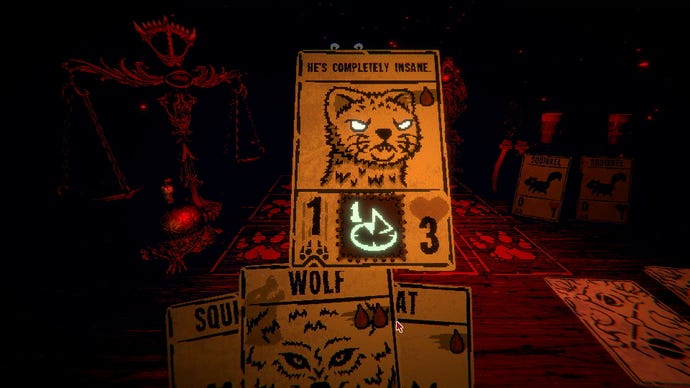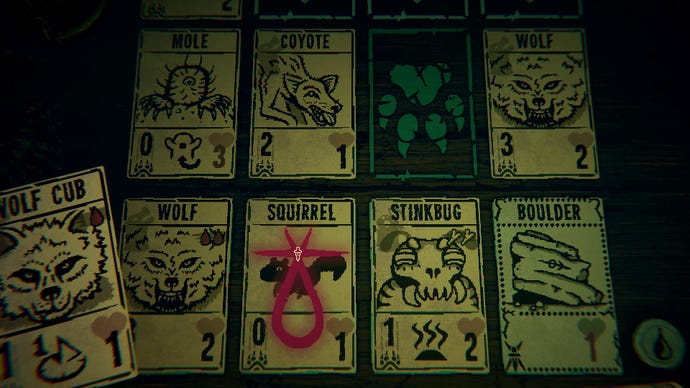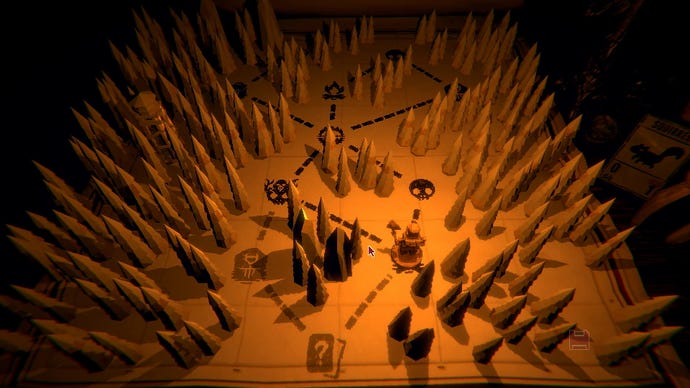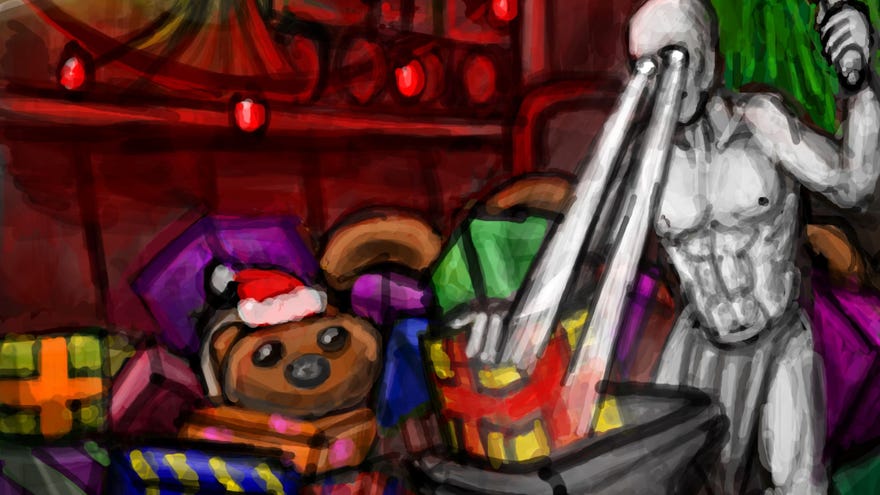The final RPS Advent Calendar 2021, December 24th
Play your cards wrong
It's the last day of the RPS Advent Calendar. This is it. It's all been leading up to this door, a wooden cabin door that's a bit tough to open. Wait, when did you put a pair of pliers in your pocket?
Our game of the year 2021 is Inscryption. Of course it is.
Alice Bee: Looking back at some of our other game of the year games, it's not really a surprise to see Inscryption nabbing the primo spot on the Calendar this year. It's a very us kind of game: weird, dark, interesting, innovative. A deck-building game that is both a great example of the genre as well as a subversion of it. A puzzle game that does weird, unsettling things. A story game that breaks the fourth wall. A lonely cabin with a stranger challenging you to play a game against him. But where are you? How did you get here? Why is that one card talking to you?
I'm still not very good at Inscryption. I'm not great at card battlers generally because I'm too impulse-driven to play strategically, to build up plans with a pay off far in the future. All my RPG character builds are based around how much damage they dole out. But Inscryption's card game is really only a small part of it, and it's surprisingly forgiving. There are weird and horrible ways to win that don't involve playing. And losing is all part of it too, of course. Unpleasant, but sort of necessary to experience.
If you played Daniel Mullins' previous games (Pony Island and The Hex) you'll be slightly more prepared for Inscryption, but you still won't know what to expect. Because sometimes you have to look up from the game on the table in front of you. And that can be really horrible.
Inscryption offers this sense of presence, of actually playing cards that you’re going to struggle to find anywhere else.
Alice0: I think I'd be perfectly happy if Inscryption were smaller and focused on the first section. I might be happier, even. While the twists and turns and growths are nice and all, the opening is so strong that the rest feels anti-climatic and starts to drag. Good as Inscryption is, I think I'd remember it more fondly if the opening section were slightly longer then credits rolled. It's good, mind.
Ed: Inscryption is special. As someone who also often lacks the patience for numbers on cardboard rectangles, this is the only card game that’s hooked me in, and for a simple reason. Namely: because it feels really good to play. Not so much the rules – although they're still quick and snappy and good – but more in the physical sense. You’re forced to play a game of cards in a dark cabin against your own will, which is a creepy premise, but it’s your relationship with these cards that brings the uneasy atmosphere to life. Some cards plead with you for aid, while you mangle others into abominations. Sacrifices must be made, mate, sorry. And at times, you must get up from your table to fetch things for your crazed master/enemy.
Inscryption offers this sense of presence, of actually playing cards that you’re going to struggle to find anywhere else. And where else would you rather be at this festive time of year, than in the company of some murderous eyes and massive hands?

Imogen: Inscryption has lots of layers. The first is a nice coating of cards, and beneath that is a creepy escape room. That's all you should really know before you play it, because when you go deeper, the game opens into something new entirely. And while, on a surface level, these things are all very fun, it's the little inconsistencies and eerie snippets within these layers that intrigued me most - a jar of ominous goo, some oddly placed binary code, off comments from your captor that suggest even they're confused about part of this situation.
For exactly this reason I insisted on having a notepad next to me the whole time while I played. I kept track of the weirdness, those tiny details that I was sure might crop up again somewhere, explaining something. After finishing the game I was left with a page of notes that didn't actually mean much, and only a few of my clues were of any help in the end. I've played it again since, too, looking for more answers in-game, and found a couple of bits I missed, but certainly not all of them. But that's so intriguing. For the first time in a while I feel no compulsion to Google what I've missed, I want to find secret stuff myself! If there are even any secrets left? The unknowing just makes it all the more exciting.

Katharine: The first time I played Inscryption as part of the October Steam Next Fest demo bonanza, I knew it was something special. In some ways, this wasn't entirely surprising to me, as both of developer Daniel Mullins' previous games, Pony Island and The Hex, had been right up my street as well. But as Alice Bee mentioned above, even this affinity for all things Mullins didn't really prepare me for quite how deep Inscryption goes down the meta-narrative rabbit hole, and I truly loved every second of it.
2021 has been an odd year for games. With many of the big blockbusters either falling short of expectations or slipping into next year due to further pandemic-related delays, that feeling of being constantly surprised and delighted by what I'm playing has been in short supply this year. In some ways, it's been a great year for indies to take centre stage, but even some of my favourites from this year, such as Chicory: A Colorful Tale, Elec Head, Ynglet, Mini Motorways, Narita Boy and Olija (which sadly didn't make it into the Advent Calendar this year but are all amazing and definitely worth tracking down), all fell into the same kind of familiar, semi-predictable patterns that have been drilled into us by their respective genres. I would still go to bat for each and every one of them, but Inscryption was the one that made my heart beat that little bit faster, the one where I genuinely didn't know what was going to happen next, and the one that occupied my brain rent-free even after stepping away from my PC for the day. That is exactly what I want from my Game Of The Year, and Inscryption has it in spades.
The card game itself might seem overly simple to hardened deck-builders and CCGers, but the way it builds on its own meta over the course of the game, twisting and subverting its own rules as you peel back the layers, is one of its greatest masterstrokes. It's not just the story that keeps you on your toes, but the card game as well, teaching and then testing you with such a deft sleight of hand-style design that you could almost swear it's a bit magic. Actually, scratch that. It is magic as far as I'm concerned, and a truly worthy winner of our GOTY 2021.

Hayden: Like the others, I knew early on that Inscryption was a special game. The eerie atmosphere and the ever-growing mystery of what the hell is going on and why that card is talking to you create an intriguing and creepy premise in the bestest best way. However, beneath all the tension and terror, Inscryption is a bloody brilliant CCG.
The strength of any CCG is its ability to let you discover synergies between cards. As you open packs (or find them hidden around a murky cabin) you’ll start to see strategies worm their way into your deck. Before long, you'll start realising that if you combine the Squirrel cards with that totem, you can get infinite sacrifices and easily play that Urayuli to really destroy your opponent. Finding those powerful combos is what really makes a good CCG and Inscryption delivers in spades.
However, strategies never last long in Inscryption. As Katharine mentions, there are lots of quick rule-changes or meta-shifts that will annihilate your deck and force you to adapt during a battle. It’s tough, so you’ll lose a lot before you fight your way to the bloody end. Changing the rules and giving the bosses an advantage might even seem totally unfair. Well, it is unfair and Leshy is a bloodthirsty, merciless monster who wants to win. By subverting expectations and actively bending the rules to make the game harder, Inscryption’s CCG constantly evolves along with its narrative to create a genre-defying synergy that I adored.


